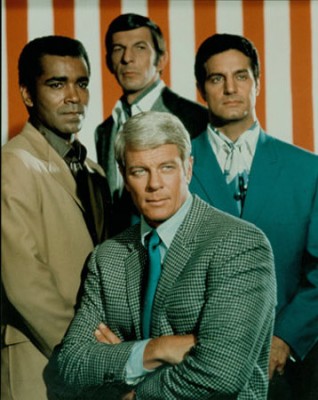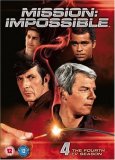| Reviews & Columns |
|
Reviews DVD TV on DVD Blu-ray 4K UHD International DVDs In Theaters Reviews by Studio Video Games Features Collector Series DVDs Easter Egg Database Interviews DVD Talk Radio Feature Articles Columns Anime Talk DVD Savant Horror DVDs The M.O.D. Squad Art House HD Talk Silent DVD
|
DVD Talk Forum |
|
|
| Resources |
|
DVD Price Search Customer Service #'s RCE Info Links |
|
Columns
|
|
|
Mission: Impossible - The Fourth TV Season
Nimoy, of course, had spent the previous three seasons playing Mr. Spock on Star Trek. Trek and Mission: Impossible started out as sister shows both originally produced by Desilu in adjacent stages on the old RKO lot with some crossover of personnel, and in fact they were Desilu's only dramatic series at the time. Paramount bought out Desilu in 1967, and while Star Trek's rating gradually slid into the toilet, at least relative to the high cost of its production, Mission: Impossible was a huge hit both critically and in the ratings game. When Landau and Bain left (reportedly over a salary dispute, though a definitive reason has yet to be uncovered), it made a lot of sense to cast Nimoy in what essentially was Landau's part in everything but name. Nimoy already had three years under his belt as a Desilu/Paramount contract player, and while Star Trek may have been cancelled, Mr. Spock still had a huge cult following.
Watching these fourth season shows, the reasons for Nimoy's miscasting eventually becomes clear. Where Landau was a product of Lee Strasberg's Actors Studio and the Method, Nimoy seems to take a more intellectual, less emotional-instinctive approach. This served him well, famously so, on Star Trek where part of the fun was watching little flashes of humanity peek through the cracks of a basically emotionless character.
The problem on Mission: Impossible was two-fold. Master of disguise Rollin Hand (Landau) could play virtually any part in the IMF's elaborate cons. Nimoy, as The Great Paris, a magician, was more limited; he was fine playing emotionally distant intellectuals, but really wasn't up to the kind of sympathetic peasant/everyman parts Rollin Hand frequently played. Moreover, Mission: Impossible's format gave little time to show the characters, er, out of character. Ninety-five percent of the show was the Mission; there was never time to learn much about the series regulars' lives except for little flashes during the "apartment scenes," while they're being briefed about the upcoming mission. Somehow Landau always found little ways to express his character's humanity. He's not particularly demonstrative, but maybe he'd smile a little at mechanical genius Barney's (Morris) cleverness, or flirt a little with Cinnamon (Bain). In these scenes Nimoy tends to stand around looking very intense, an "I'm taking this mission very seriously" approach - and that's valid enough, but it doesn't invite the viewer to warm up to the character, either.
The other problem, somewhat related to the first, is that by the 1969-70 season the craze for spy movies and TV shows had pretty much petered out. Shows like The Man from U.N.C.L.E. and I Spy were off the air, and the Harry Palmer, Derek Flint, and Matt Helm movies had ended. Mission: Impossible meanwhile was still basically the same show, albeit with wider ties, shaggier hair, and a lot more bright paisley suits. The show's rigidly structured format, initially appealing in its familiarity, had grown stale and the Big Cons that were surprising and unpredictable were becoming repetitive and easy to anticipate.
The producers seemed aware of this; they started testing the waters a bit during Season Four and by the following year decided they had pretty much exhausted the international espionage angle - considering that the IMF had visited about 150 fictional Iron Curtain regimes and South of the Border dictatorships, that's hardly surprising - moving the show toward more domestic storylines about the Underworld.
An early example of this move away from the established formula is a late-season episode, "Lover's Knot," a mostly terrible show set in London that has no tape scene, no dossier scene, and no apartment scene. Besides plunging right into the thick of the story (the effect is really jarring), the episode was directed by busy TV helmer Reza Badiyi, best remembered as the creator of Hawaii Five-O's famous opening titles. Badiyi tries adding a lot of visual oomph to the show: weird camera angles, lots of goofy dissolves, etc., but this only dates the show more than even the earliest Steven Hill episodes.
The episode also finds Paris falling in love with a Russian spy (Jane Merrow) the IMF team is trying to manipulate. Though this atypical bit of characterization is welcome, the episode is also emblematic of Nimoy's shortcomings as an actor; he's just too inexpressive during the love scenes. There's no passion, no sense of being torn between love and duty; throughout the episode, Nimoy's like a cigar store Indian. (I don't mean to sound unduly harsh, and to his credit he did get better over time, delivering fine work in both A Woman Called Golda and Never Forget, to cite two examples.)
It's also hysterically funny. Throughout the show are little moments where Paris, him being in love and all, abruptly saying something completely out of character. Cut to a two-shot of Jim Phelps (Peter Graves) and Barney, who exchange silent, worried glances. This happens about six times during the episode: Paris gets emotional (or as emotional as Nimoy can get), cut to Jim and Barney with big "Uh-oh!" looks on their faces, each more comical than the last.
Thankfully, they left Barbara Bain's part open for the entire season, allowing for an interesting range of actresses to essentially screen test throughout the season. Lee Meriwether appears in the most episodes as Tracy (or Tracey). A few surprising faces turn up in this slot, such as Sally Ann Howes, fresh from Chitty Chitty Bang Bang, but part of the surprise is watching who turns up where. Other guest stars this season include: Michael Constantine, Harold Gould, May Britt, Torin Thatcher, Dina Merrill, Afred Ryder, Nehemiah Persoff, David Opatoshu, Sid Haig, Paul Stewart, Malachi Throne, Larry Linville, Anne Francis, Henry Brandon, Joseph Ruskin, Bert Freed, Barbara Luna, Steve Ihnat, Anthony Zerbe, Diane Baker, John Vernon, Fernando Lamas, Gregory Sierra, Peter Mark Richman, Antoinette Bower, Luther Adler, Arlene Martel, John Williams, Albert Paulsen, Bruce Glover, Booth Colman, Leon Askin, Pernell Roberts, Cicely Tyson, Arthur Franz, John Larch, and Anna Lee.
Video & Audio
Mission: Impossible - The Fourth TV Season looks good if not spectacularly great like the first few seasons. Colors here are less vivid, though that may be more the effect of the cinematography than colors fading with age. Generally, the full-frame episodes are reasonably sharp, and there's little signs of age-related wear or damage. Unlike CBS Video's controversial, inexcusable wholesale tampering of The Fugitive's entire underscoring, Mission: Impossible's library of familiar cues appears untouched in this set, though I didn't watch every episode. Despite the standard CBS DVD/Paramount warning that "some episodes may be edited from their original network versions," I saw no evidence of editing or time-compressed shows, though eagle-eyed readers who spot any problems are invited to write in and I'll amend the review. The shows are offered in their original mono, but the audio defaults to a strong Dolby Digital 5.1 mix for the opening theme. A Spanish mono track is included, along with optional English, Spanish, and Portuguese subtitles. There are no Extra Features.
Parting Thoughts
Mission: Impossible - The Fourth TV Season is just okay. It's interesting to watch Nimoy in his first post-Spock role, but Landau and Bain are sorely missed. Episodes are fairly entertaining but increasingly mechanical. If you're not a die-hard fan of the series but liked the first three seasons, this is probably the last one you'll want to get. Recommended.
Film historian Stuart Galbraith IV's latest book, The Toho Studios Story, is on sale now.
|
| Popular Reviews |
| Sponsored Links |
|
|
| Sponsored Links |
|
|
| Release List | Reviews | Shop | Newsletter | Forum | DVD Giveaways | Blu-Ray | Advertise |
|
Copyright 2024 DVDTalk.com All Rights Reserved. Legal Info, Privacy Policy, Terms of Use,
Manage Preferences,
Your Privacy Choices | |||||||
















